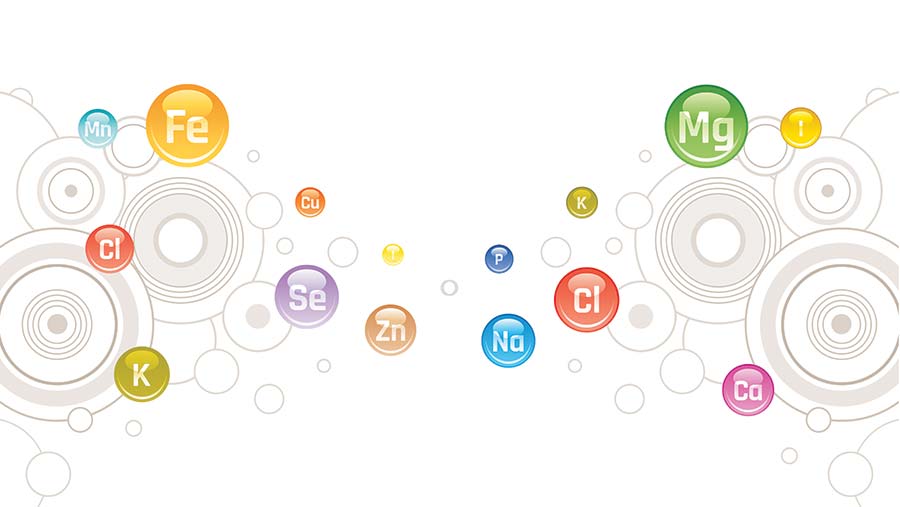Small amounts but necessary
Writer: Franz Gliederer, MD, MPH, and Joy Stephenson-Laws, JD (Proactive Health Labs)
Don’t overlook trace minerals.
Like vitamins, minerals are nutrients you receive from food to nourish your body. There are six types of nutrients your body cannot live without: carbohydrates, fats, proteins, vitamins, minerals, and water. While each has its own role, none is more important than the other.
The primary role of minerals is to help your body carry out daily functions and processes in the most efficient and beneficial way. There literally is no bodily process, on either the cellular or systemic level, that operates at its best without the right amounts of minerals.
Minerals have a significant impact on blood pressure, weight management, cancer prevention, depression, pain, PMS, and digestion, to name a few categories.
Trace minerals are the metal ions needed by your body in very small. They are:
• Building blocks for hundreds of enzymes.
• Facilitators for biochemical reactions.
• Required for normal growth and development and neurological functions.
• Antioxidants.
• Supporting the blood system.
• Necessary for certain hormones.
• Required for normal gonadal development.
Here are the most important trace elements:
• Iron is an essential component of many proteins and enzymes and vital in the formation of red blood cells and lean muscle. Iron deficiencies occur worldwide. It is found in red meat, poultry, seafood, and dark leafy vegetables.
• Chromium helps with insulin functions and glucose metabolism. Normally, a well-balanced diet (fruit, vegetables, meat, fish, and grains) should fulfill daily dietary need.
• Copper is a component in many enzymes involved in such key functions as energy production, iron metabolism, healthy connective tissue, neurotransmission, and the making of hemoglobin. Copper is in meats, shellfish, nuts, and seeds, wheat bran cereals, and whole grain products.
• Zinc is necessary for normal growth and development in children, proper functioning of the immune system, many neurological functions, and reproduction. Zinc-rich foods are oysters, beef, crab meat, dark-meat chicken and turkey, pork, yogurt, milk, cashews, chickpeas, almonds, peanuts, and cheese.
• Iodine is a well-known component of the thyroid hormone. Iodine deficiency has detrimental effects on the developing brain and causes mental impairment and retardation in children. About 120 countries fortify salt with iodine to counteract iodine deficiency. Seafood is an excellent source, along with dairy products, grains, eggs, and poultry, for dietary iodine.
• Manganese is an ingredient and facilitator in many enzymes that have antioxidant benefits for metabolic functions, bone development support, and wound healing. Rich sources of manganese include whole grains, nuts, leafy vegetables, and teas.
• Selenium is part of the amino acid selenocysteine, which occurs in 25 different seleno proteins. These proteins play critical roles in reproduction, thyroid hormone metabolism, DNA synthesis, and protection from oxidative damage and infection. Seafood and organ meats are the richest food sources of selenium.
Recommended Daily Intake (RDI) published by the National Institutes of Health:
• Chromium – 25 mcg for women and 35 mcg for men.
• Copper – 900 mcg for both men and women.
• Iodine – 150 mcg for both men and women.
• Iron – 18 mg for women and 8 mg for men.
• Manganese – 1.8 mg for women and 2.3 mg for men.
• Molybdenum – 45 mcg for both women and men.
• Selenium – 55 mcg for both women and men.
• Zinc – 8 mg for women and 11 mg for men.
How do you know if you have the right amount?
Many people believe they get the right amounts of minerals and other nutrients by “listening” to their bodies and eating the foods they crave. Most of the time, however, they may just feel a little off and have no idea why.
The best thing to do is to get comprehensive nutritional testing to see if your body has the right balance of trace minerals and other nutrients. If you do have an imbalance, address it with diet or supplementation.
Why you may not be getting enough trace minerals
• Poor diet: The top reason you may not be getting enough trace minerals.
• Where you live: Trace mineral amounts in soil and water are not the same in all parts of the world.
• Malabsorption and gastrointestinal diseases: If the gastrointestinal tract becomes inflamed, infected, or diseased, this interferes with absorption of minerals.
• Surgery: Surgical resection of bowel segments may cause a loss of uptake and carrier channel sites.
• Pregnancy: Trace mineral deficits frequently occur.
While it is rare to encounter severe trace mineral deficiency in the Western World, mild to moderate deficiencies are common and may lead to general symptoms such as fatigue, slow metabolism, decreased immune system, and mental capacities.
About the authors
Franz Gliederer, MD, MPH, is a doctor with Proactive Health Labs and a specialist in preventive medicine with a medical doctorate from the University of Vienna, Austria, and a master’s degree from the University of California Public Health School. He is a co-author with Joy Stephenson-Laws of “Minerals – The Forgotten Nutrient: Your Secret Weapon for Getting and Staying Healthy.”
Joy Stephenson-Laws, JD, is the founder of Proactive Health Labs (www.phlabs.org), a national nonprofit health information company in Santa Monica, California, providing education and tools to achieve optimal health.

